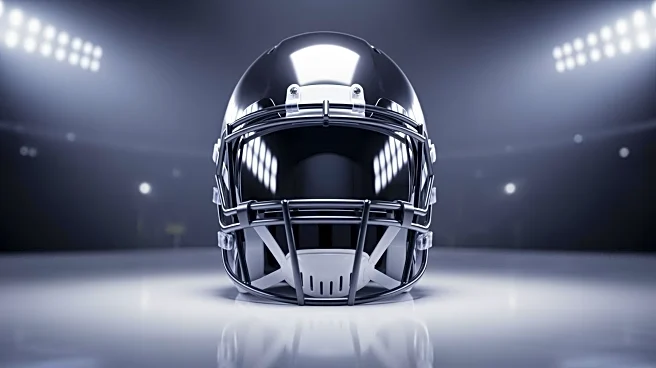What's Happening?
Jayden Daniels, quarterback for the Washington Commanders, suffered a dislocated left elbow during a game against the Seattle Seahawks. Despite the injury, an MRI revealed no ligament damage, and Daniels will not require surgery. The Commanders have decided
not to place him on injured reserve, which would have sidelined him for at least four weeks. Instead, Daniels will be re-evaluated after the team's Week 12 bye. The injury occurred late in the game, with the Commanders trailing by 31 points. Daniels was tackled and landed awkwardly on his left arm, leading to the dislocation. Head coach Dan Quinn expressed regret over the situation, acknowledging that the play was not a designed quarterback run and taking responsibility for the injury.
Why It's Important?
The injury to Jayden Daniels is significant for the Washington Commanders, who are currently struggling with a 3-6 record this season. Daniels, the NFL Offensive Rookie of the Year last season, is a key player for the team, and his absence could impact their chances of making the playoffs. The Commanders are two games out of the playoff mix in the NFC East, and losing Daniels for an extended period could further hinder their performance. The decision not to place him on injured reserve suggests optimism about his potential return, which could be crucial for the team's efforts to improve their standing in the conference.
What's Next?
Jayden Daniels will be re-evaluated after the Commanders' Week 12 bye, which will determine his readiness to return to play. The team will likely monitor his recovery closely, considering his importance to their offensive strategy. Depending on the outcome of the re-evaluation, Daniels could return later in the season, potentially boosting the Commanders' chances of securing a playoff spot. The team's management and coaching staff will need to strategize on how to handle upcoming games without their star quarterback, possibly adjusting their offensive plays to accommodate his absence.
Beyond the Headlines
The injury raises questions about player safety and the decision-making process during games, especially when the outcome is already determined. Head coach Dan Quinn's admission of responsibility highlights the pressure coaches face in making real-time decisions that can impact player health. This incident may prompt discussions within the league about the protocols for protecting players in similar situations, potentially leading to changes in how teams manage game strategies when trailing significantly.














